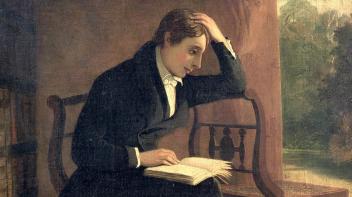I have been working for the past couple of years on a new book that brings together, finally, my disparate interests in premodern English poetry and contemporary American avant-garde poetry. I was a poet before I was a medievalist. I used to be defensive about the non-relation between these interests. I wanted to make sure everyone knew the poetry I was writing and reading wasn’t medievalizing or nostalgic. On the contrary. Having studied with Elizabeth Willis in college, my map of contemporary poetry centered on the kinds of avant-garde poetry made after the confessional poetry movement and after the heyday of L=A=N=G=U=A=G=E magazine. There’s no agreed-upon name for this strand of contemporary poetry, the strand most often being reproduced in prestigious MFA programs these days. It is easier to convey what is meant by listing some poets you may have heard of: Ben Lerner, Claudia Rankine, Prageeta Sharma, Juliana Spahr, Willis. They were born in the 1960s and 1970s. Anthony Reed’s term post-lyric, which he applies specifically to Rankine, could apply to all of them. So usefully, Reed stresses that the post– doesn’t mean lyric has been superseded but that it has grown belated and ashamed of itself, like the –racial in post-racial.
This is going to be my longest book! It takes a while to flesh out the critical terms I need to make the leap from the fourteenth century to the twenty-first. Terms like author, lyric, meter, and source.
Two of the last chapters of the book that I’ve been working on lately compare Chaucer to Rankine and to Willis. These are unexpected, difficult pairings. There’s no historical connection in either case. Rankine’s poetry and prose poetry, while conscious of their place in a history of violent race making, are determinedly presentist, so presentist that one page of Citizen underwent gut-wrenching expansion in subsequent printings to include names of further Black people murdered by police in 2014. Willis does think historically but focuses on the pre-Raphaelites, the subject of her dissertation.
Instead, I pursue a formal homology. Chaucer shares with Rankine on one side and with Willis on the other forms of what I am calling apophatic effects. With Rankine (and many other avant-garde poets), Chaucer shares a sense of lyric poetry as missing, absent, already erased, unavailable. That chapter centers on Chaucer’s Death of Blanche the Duchess, the Parliament of Fowls, and the short lyric Fortune, and on Rankine’s 2004-2020 Graywolf Press trilogy Don’t Let Me Be Lonely—Citizen—Just Us. With Willis, Chaucer shares a propensity to stage moments of unrecognizable allusions, as when the dreamer of the Death of Blanche the Duchess alludes to a never-identified “phisycien” who can “heale” him (39-40). This chapter is still in progress but likely will touch on Chaucer’s House of Fame, Parliament of Fowls, and Fortune again, and on Willis’s last three books, Meteoric Flowers (2006), Address (2011), and Alive: New and Selected Poems (2015). (Chaucer’s dream visions and lyrics I find easier to like than the Canterbury Tales, which makes me weird.)
Juxtaposing Chaucer and the avant-garde is mutually illuminating. Rankine helps me see the whiteness of Chaucer’s lyric subject, and Willis helps me see the radical nature of Chaucer’s spectral citationality. Chaucer in turn grounds avant-garde poetics in a much longer history of verse craft. His example suggests that some paradoxes of poetic making aren’t new.
Further reading
Reed, Anthony. “The Erotics of Mourning in Recent Experimental Black Poetry.” The Black Scholar 47 (2017): 23-37.

You must be logged in to post a comment.